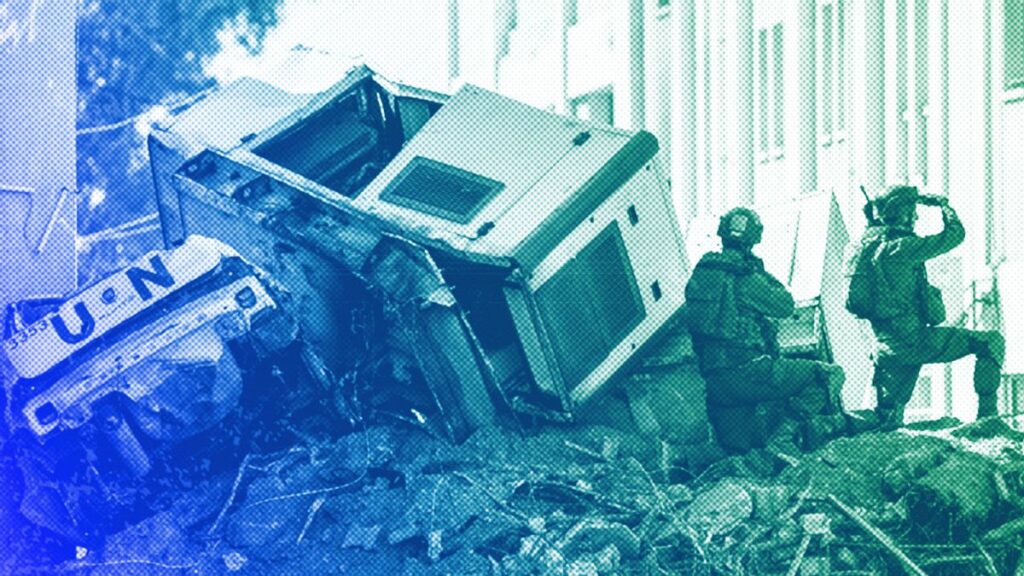The opinions expressed in this article are those of their author and in no way represent the editorial position of Euronews.
The global consensus on the essential nature of humanitarian work too easily gives way to morality, often with devastating consequences. It’s time to reclaim that ground, write Ambassador Mark Wallace and Dr. Hans-Jakob Schindler.
Evidence implicating employees of the United Nations Palestinian Refugee Agency (UNRWA) in the October 7 terrorist attacks should come as no surprise to anyone who has closely followed the activities of the United Nations agency for Palestinian refugees.
Allegations that some UNRWA employees were actually Hamas agents are just the latest manifestation of a much larger problem affecting the international aid sector.
The astonishing lack of oversight and regulation of humanitarian funds over the past decades has allowed countless billions of taxpayer money to end up in the coffers of terrorists.
While aid agencies may object to what they perceive as heavy “red tape”, strict control and transparency are in fact fundamental to humanitarian work: they ensure that aid gets to those who need it. need it, and not diverted for the benefit of extremist and terrorist groups.
Claims of ignorance are becoming less and less credible
For years, UNRWA welcomed actors with little interest in a peaceful resolution of the Israeli-Palestinian conflict.
According to a file presented by the Israeli intelligence services, one in ten staff members is a terrorist “agent”.
Some 23 percent of male UNRWA workers in Gaza have ties to Hamas or Palestinian Islamic Jihad (PIJ), compared to 15 percent of all men in Gaza. And 49% would have “close relatives” also linked to Hamas or PIJ.
UNRWA’s claims that it was unaware of Hamas’ vast network of tunnels beneath schools and hospitals, financed by billions of dollars in diverted aid, are increasingly less credible.
Over the years, several UNRWA personnel have been revealed to be terrorists or leaders of terrorist organizations, including Awad al-Qiq, PIJ rocket maker, Said Siam, former Hamas interior minister , and Humam Khalil Abu-Mulal al-Balawi, a suicide bomber who killed seven CIA employees in Afghanistan in 2009.
On October 7, 12 UNRWA personnel helped Hamas carry out the massacre or assisted the group following the attack.
According to the file, one of the agency’s employees took a woman hostage, another distributed ammunition and a third participated in a killing on an Israeli kibbutz.
This case is not an exception
How did aid workers come to play a role in the worst massacre of Jews since the Holocaust?
In reality, UNRWA is far from being an exception when it comes to financing humanitarian terrorism. In the world of international aid, this is an occupational hazard.
Throughout the 1990s, the Taliban regularly harassed and robbed aid agencies. The current Taliban regime also uses a network of fictitious local organizations to divert aid money.
In the early 2000s, reports emerged that in Somalia, al-Qaeda affiliate Al-Shabaab had siphoned off so much international aid that it had created a “Humanitarian Coordination Office”asking support groups to “register.”
Several years later, al-Shabaab continued to extort aid through roadblocks and so-called “taxes.”
In 2018, a partial audit by the United States Agency for International Development (USAID) found that some €649 million of US taxpayer-funded programs in Iraq and Syria had been inappropriately monitored.
The same year, several dozen individuals and organizations that received USAID funds in the region were blacklisted and more than €185.5 million in funds were frozen.
The Houthi rebel group in Yemen is stifling almost all flow of international aid into the areas it controls. He created a “humanitarian” agency, the “Supreme Council for the Management and Coordination of Humanitarian Affairs and International Cooperation” (SCMCHA), with the aim of redirecting aid for its own activist purposes. The results have been catastrophic for the Yemeni people.
Decisions that have aged poorly
Aid regulation is not limited to mitigating security concerns. On the ground, any money given to a militant group is unlikely to achieve its stated objectives and, as in the case of UNRWA, actually exacerbates the conflict it is trying to alleviate.
Just two years ago, the Biden administration resumed funding UNRWA based on the organization’s commitments to “transparency, accountability and neutrality.”
Several European governments, including Germany, even increased funding for UNRWA following the October attacks.
These decisions have obviously not aged well. But they are the result of a steady stream of arguments from humanitarian workers and aid groups who say regulations and sanctions, even with humanitarian exemptions, do nothing but hinder their work.
This attitude is dangerously dismissive, as former UNRWA General Counsel James Lindsay wrote in a 2009 report: “UNRWA has taken very few steps to detect and eliminate terrorists from (its) ranks…and no steps to prevent members of terrorist organizations, such as Hamas, from joining.”
We cannot continue to give in to the temptation of morality
Brutal terrorist groups and extremist regimes will always view humanitarian funds as quasi-savings banks to bolster their own power.
Effective monitoring, budget transparency, comprehensive reporting requirements, as well as internal and external controls are essential elements to ensure that any emerging problems are detected quickly, that aid diversion is mitigated and that Safeguards are put in place to prevent international aid workers from being involved in terrorist groups or attacks.
Despite criticism from EU High Representative for Foreign Affairs Josep Borrell, several European countries, in addition to the United States, have suspended payments to UNRWA. This is a step in the right direction.
The global consensus on the essential nature of humanitarian work too easily gives way to morality, often with devastating consequences.
It is time to rediscover this ground, which has for too long served as a cover for the worst acts of terrorism.
Ambassador Mark Wallace is Executive Director and Dr. Hans-Jakob Schindler is Senior Director of the Counter Extremism Project.
At Euronews, we believe that all points of view are important. Contact us at view@euronews.com to send proposals or submissions and join the conversation.


